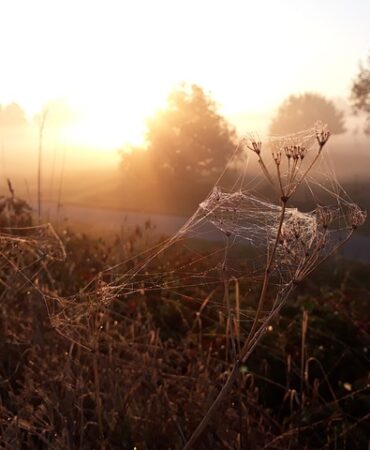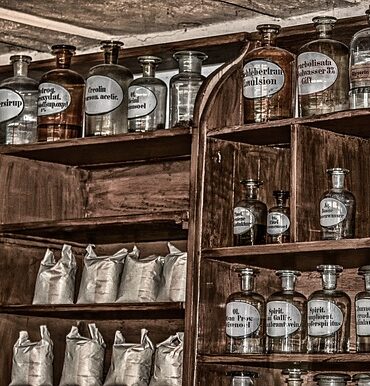Currently Empty: £0.00
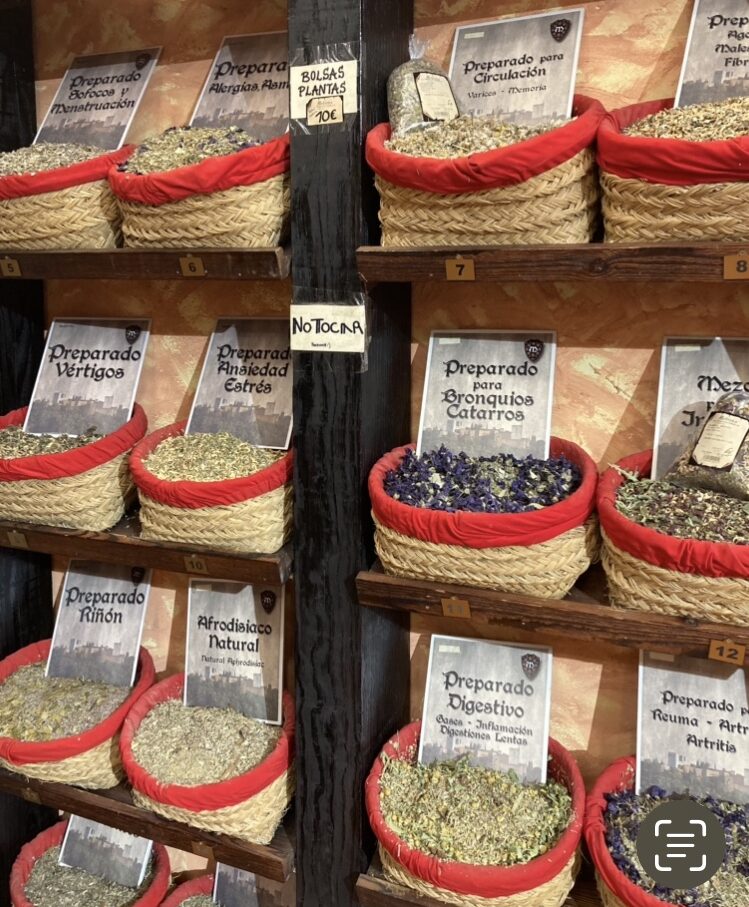
A herb shop on every corner
Herbal living
I would love to see herbs embraced more into our everyday lives in Britain. Not just considered as an embellishment to food, or a pretty addition to the garden, but truly relied upon as bringers, maintainers and restorers of health and vitality. Especially with an attitude towards prevention being better than cure, we need to learn once again how herbs can be as important to us now as they were for our pre-industrial forebears.
Imagine a future scenario where each town has its own herb shop, a place people go, as readily as they would a pharmacy, to pick up supplies of whatever herbal teas or remedies they need to support their digestion, immunity, libido, general health or specific problems. Envisage the benefits this could bring for individuals, and for our over-burdened NHS as we take proactive care of ourselves to maintain health, fitness and mental wellbeing – all supported by herbs. Anticipate the change in attitude to our environment as we recognise the beneficial herbs that grow around us, seek them out and ensure they and their habitats thrive, for the good of all.
Feels rather whimsical and far-fetched, maybe? As herb-lovers and herbal-practitioners, that may be the way we choose to live, but it is certainly not commonplace in the UK. If it were, every town would be able to sustain at least one, probably many more herb shops providing for these needs with herbs, blends and advice.
Herb shops
Many will remember the lovely Culpeper stores, popular in towns across the UK during the 20th Century. They were founded by the very same person who founded the Herb Society, Hilda Leyel. Her first shop, in 1927, was at 10 Baker Street; by 1939 there were about ten shops, and by 1998, there were nineteen shops across the UK. But in 2011 the business went into administration and the shops disappeared from our high streets.
You will probably have further examples of local herb shops that have come and gone in towns up and down the country. I would like to think we are gradually seeing the emergence of more herbal havens, but in the UK they typically have an ‘alternative’ vibe. We will need to see far more of those currently empty high street shops filled with herbs and herbalists before we can say herbal living has gone mainstream.
So, imagine my surprise when I recently spent a few days in Granada, southern Spain. The motivation for visiting was to see the Alhambra; the bonus surprise that made it a super memorable trip was finding a vibrant herb culture infiltrating the city with numerous herb shops, large and small, being frequented by locals and tourists alike.
Herb tour
My first encounter with such a shop was on an evening food tour, led by a Russian lady, Katia who embraced Spanish food and lifestyle having lived in Granada for 20 years working as a chef. She was clearly passionate and highly knowledgeable and, like me, loved to dive into historical references and traditional uses for herbs and spices. It was wonderful to be whisked from fine restaurant to even finer restaurant – especially as she took us via the souk-like streets and introduced us to Medievo, the herb shop (open in the evening!) with a brief talk on the herbs there, as well as the dried fruit and nuts (all preservative free) iconic to natural living in Spain. And that was just one of the FOUR Medievo shops in Granada!

The tour gave us a wonderful experience of Spanish living. With her restauranteur friends, Katia conjured up specialty dishes – such as oxtail croquet, cod Ajo arriero, and of course plenty of Manchego cheese and Iberian ham, with an olive oil tasting, and some truly delicious wines. Early in the evening she had asked us if we preferred strawberries or raspberries. Then as the red wines came out, she was able to predict who would prefer which, based on our fruit choices. She was right. My love of raspberries equaled the enjoyment I got from a very rich red from the local Munana vineyard.
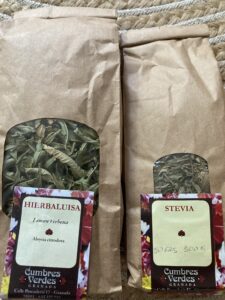
But it was the herbs that I was keen to explore more. The next day I visited a smaller herb shop, Cumbres Verdes (named after the local mountain range). While I was purchasing a bag stuffed with lemon verbena, another with stevia leaves, and also a packet of ‘Seven Veils Tea’ (I admit, the name must be for the tourists, it’s a mysterious blend of three teas, three fruits and a flower), a middle-aged man entered holding a scrap of paper which he referred to for names of herbs he was looking for (had he googled, or been told by his wife or mother, I wondered?). Though my Spanish is sadly non-existent, from the herbs the helpful lady at the counter selected I suspected he was constipated. How wonderful that the first port of call with a minor inconvenience or ailment is to pop to your local herb shop for a remedy.
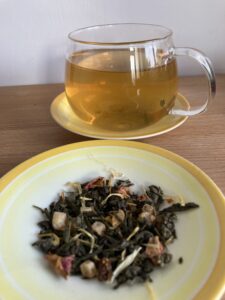
Healthy long lives
I recalled Katia’s reference from the evening before to Spain’s credentials for long living. Searching for the facts, I can see the OECD ranked Spain as their number three country for life expectancy in 2022. On some broader studies, Spain hovers roughly between 8th and 11th ranking. But still, at 83 years, Spain is certainly above the UK’s 80.7 years average. Could such a thriving herbal culture be a contributory factor to the Spanish people’s longevity?
The reasons the Spanish give include:
- Their diet with lots of fresh vegetables, fruit, fish and all that olive oil providing a rounded supply of omegas.
- Sunshine as a source of vitamin D and feel-good serotonin.
- Wine, with its polyphenols and antioxidants is drunk in moderation (consumption is lower than in the UK), often from local vineyards.
- Walking, which is popular both functionally and especially for leisure at a gentle pace.
- A healthcare system that focuses on preventative methods, including taking regular breaks through the day.
- Living in community with old and young all partaking in a vibrant social life
- and a propensity to celebrate. I was there during holy week so, indeed, there were celebrations and parades happening every day, we could see the full vibrancy of the Spanish culture.
There is another thing the Spanish are famous for – their tapas. Go into a bar for a drink and you will find a small plate of food is brought too. It could be any delicious thing from beans in a sauce, to crab salad, or meat balls, we never had the same thing twice. It was always a surprise, and you never really knew what it was until eating it. No ingredients list, allergy warnings or vegan options. Are such things simply not a concern to the healthy-living Spaniards? They showed trust in their food culture, an assumption of health and confidence in freshly prepared, great-tasting food.
Thriving herb shops
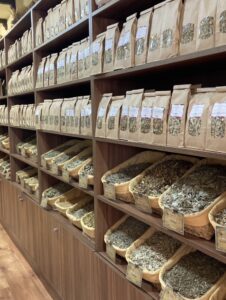
I would see their thriving herb shops, if not the reason, then as an indicator of this good living. They encapsulate the plant-based, locally-sourced diet; an awareness of balancing constituents and taking a little of what you need when you need it; as well as having a shared understanding and honoring of the good things around them. I would suggest, therefore, that any widespread re-emergence of herb shops or stalls in the UK could be welcomed not just for the produce they offer, but also as a gauge of our health as a population – where the herb shops thrive, so do the people.
So, apologies for briefly turning this herb blog into more of a travelog, but I was so inspired by what I saw, I wanted to share it with you. I hope you have enjoyed this little venture, and can maybe venture a little hope of a herb shop popping up once more on a street near you.


